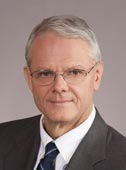Chair's Column:
Transforming Surgery
BEYOND THE CUTTING EDGE
DEPARTMENT OF SURGERY STRATEGIC PLAN 2012-2017

James Rutka
|
Many of you will recall that our
last major Strategic Plan was
performed in 2004, and was
entitled “Breaking through the
Boundaries”. In this plan led by
Richard Reznick, efforts were
made to strengthen and renew
the faculty, enhance teaching
and enrich the student experience,
increase academic productivity
and impact of research,
promote inter-disciplinarity in all academic activities,
and explore alternate sources of revenues. I am pleased to
say that the majority of goals set at that time have been
accomplished. Accordingly, it is now timely and opportune
for us to embark on a new strategic planning effort
this academic year.
In August 2011, the Executive Committee of the
Department of Surgery (James Rutka, Ori Rotstein, Robin
Richards, Robin McLeod, Avery Nathens, Ben Alman and
David Latter) met to discuss the key issues and challenges
facing the Department of Surgery over the next 5 years.
This led to a departmental survey of faculty, residents and
fellows in September 2011 to determine all critical elements
that should be part of the strategic planning process. I am
pleased to report that there were over 150 respondents to
the survey from across all of our institutions. Respondents
selected our areas of greatest need to be post-graduate
medical education, undergraduate medical education, best
surgical practices/quality, surgical innovation and simulation,
and faculty development. Faculty mentoring and the
potential of a competitive pension plan were also considered
to be important issues to address. When asked what the
single most important issue is facing the Department of
Surgery, the following responses received multiple hits: Jobs
for graduating residents; integration of academic activities
across all institutions; support of surgical research; surgical
innovation; international surgery; recruitments, retentions,
and retirements; and fundraising or advancement.
These survey responses have helped us focus our attention
on 5 major themes going forward: 1) Education;
2) Faculty Development; 3) Best Practices/Quality; 4)
Research; and 5) Integration. Cutting across all themes
will be advancement, innovation, and our social responsibility
as surgeons.
The timing of our Strategic Planning initiative is
perfect, as we can harmonize our efforts with the
recently developed and publicized Faculty of Medicine
strategic plan (http://www.facmed.utoronto.ca/Assets/ FacMed+Digital+Assets/Leadership/Strategic+Academic +Plan+2011-2016.pdf). In this plan, integration, innovation,
impact, and social responsibility are the key
goals to be achieved over the next 5 years. It is clear that
these goals resonate precisely with what ours will be and
should be as we move forward.
In October 2011, a Strategic Planning Steering
Committee was formed to execute the workplans behind
each of the 5 major themes (See Table I). Leads were
identified for each of the five working groups, and
membership was identified for each working group from
across all institutions in the fully affiliated and community
affiliated hospitals. In discussion at the October
13th, 2011 meeting of the Steering Committee, there
were several areas that were identified that require attention
and focus. Among these are: Undergraduate medical
education, job preparation for graduating residents,
surgical simulation, international surgery, the surgeonscientist,
harmonization of research ethics boards across
the campus, faculty mentoring, career transitioning, best
practices/quality delivery of surgical services, and university
versus hospital institutional dynamics.
|
I am pleased to inform you that we have retained
Helena Axler as our Strategic Plan facilitator. Helena
helped us with our 2004 Strategic Plan, and knows the
Department well. The working groups for this strategic
plan have met frequently in preparation for the
Strategic Planning retreat to be held on Friday January
27th, 2012, at the University Club. At the retreat,
invited guest speakers include Robert Bell, President
and CEO, University Health Network; Robert Di
Raddo, Scientific Lead, NeuroTouch simulation project,
National Research Council of Canada; Dean Catharine Whiteside; Vice-Dean Jay Rosenfield; and Kevin Imrie,
Lead, Pan Canadian Duty Hours initiative, the Royal
College of Physicians and Surgeons.
Following the Strategic Planning Retreat January 27th,
the Steering Committee will be meeting on several
more occasions to amalgamate the information from
the retreat, and to synthesize the final plan to be made
public in the spring of 2012.
I look forward to working with all of you on our new
Strategic Plan. This plan will provide the blueprint of
our future directions in the Department as we transform
surgery beyond the cutting edge over the next 5 years.
James Rutka
Table I:
Strategic Planning Steering Committee Members:
James Rutka, R S McLaughlin Professor and Chair, Surgery
Robin Richards, Vice-Chair Clinical, Surgeon-in-Chief
(SHSC)
Ori Rotstein, Associate Chair, Surgeon-in-Chief (SMH)
Robin McLeod, Vice-Chair Quality
Ben Alman, Vice-Chair Research, Division Chair
Orthopedics
Avery Nathens, Chair Departmental Appointments
Committee
David Latter, Vice-Chair Education, Division Head Cardiac
Surgery (SMH)
Bryce Taylor, Professor, General Surgery
Dimitri Anastakis, Professor and Chair, Plastic and
Reconstructive Surgery
Carol Swallow, Division Head, General Surgery (Mt Sinai)
Cindi Morshead, Division Head (Anatomy
Ron Levine, Director PostGraduate Medical Educatio
George Christakis, Director UnderGraduate Medical
Education
Andras Kapus, Associate Chair Research
Lakho Sandhu, Resident, General Surgery
Norman Hill, Vice President, Medical and Academic Affairs,
Trillium
Darina Landa, Senior Development Officer Surgery
Andy Williams, Vice President, Sales and Marketing, J&J
Nancy Condo, Business Officer (Surgery)
|